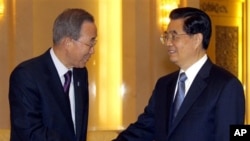U.N. Secretary-General Ban Ki-moon has come under increasing fire this week, as his commitment to defending human rights has been questioned after a visit to China in which he was seen to have been less than vocal on human rights abuses there.
Mr. Ban often says that peace, security and human rights are the three main pillars of the United Nations.
But Mr. Ban's commitment to human rights is being questioned after he visited China and failed to raise the issue with President Hu Jintao.
Mr. Ban also did not publicly call for the release from prison of Liu Xiaobo, a vocal critic of China's government who is serving an 11-year sentence for co-authoring Charter 08 - a petition published to mark the 60th anniversary of the Universal Declaration of Human Rights. Mr. Liu was awarded the Nobel Peace Prize last month.
On Monday, the United Nations said Mr. Ban raised a number of issues with President Hu, including climate change, the Korean Peninsula and Africa. But his spokesman, Martin Nesirky, said human rights was not raised.
But as the criticism has grown, the U.N. has added that Mr. Ban did raise the topic of human rights with "other Chinese leaders," although his spokesman would not elaborate to reporters on who they were. "Sometimes when tackling the question of human rights, which is undoubtedly important, it is also important to do this in a well thought-out way. And sometimes that means it is not always played out as much as you would like, in the glare of publicity," the spokesman said.
Spokesman Nesirky also emphasized that the U.N. chief did address the subject Wednesday during a speech at the Central Party School.
In a text of that speech, the Secretary-General speaks about the values embedded in the Universal Declaration of Human Rights, saying they are "unrealized in far too much of the globe." He said those rights must be made real in people's lives, adding "that will take a global effort. China's voice and example are critical."
But Human Rights Watch U.N. Advocacy Director Philippe Bolopion asks if the U.N. Secretary-General goes to China and does not mention human rights, then who will?
"In our view, the meeting that counts the most is the meeting with the president. And if as the U.N. Secretary-General during that meeting you don't bring out the question of human rights, you are really failing the organization and failing people in China who are trying to defend human rights, and who have been under increasing pressure since the nomination of the Nobel Peace Prize," he said.
The Secretary-General is nearing the end of his first five-year term and is expected to run for re-election next year. Some critics have said he is afraid to ruffle the feathers of veto-wielding Security Council member China, who could end his hopes of a second term.
Criticism of UN Chief Growing on Silence on China Rights




